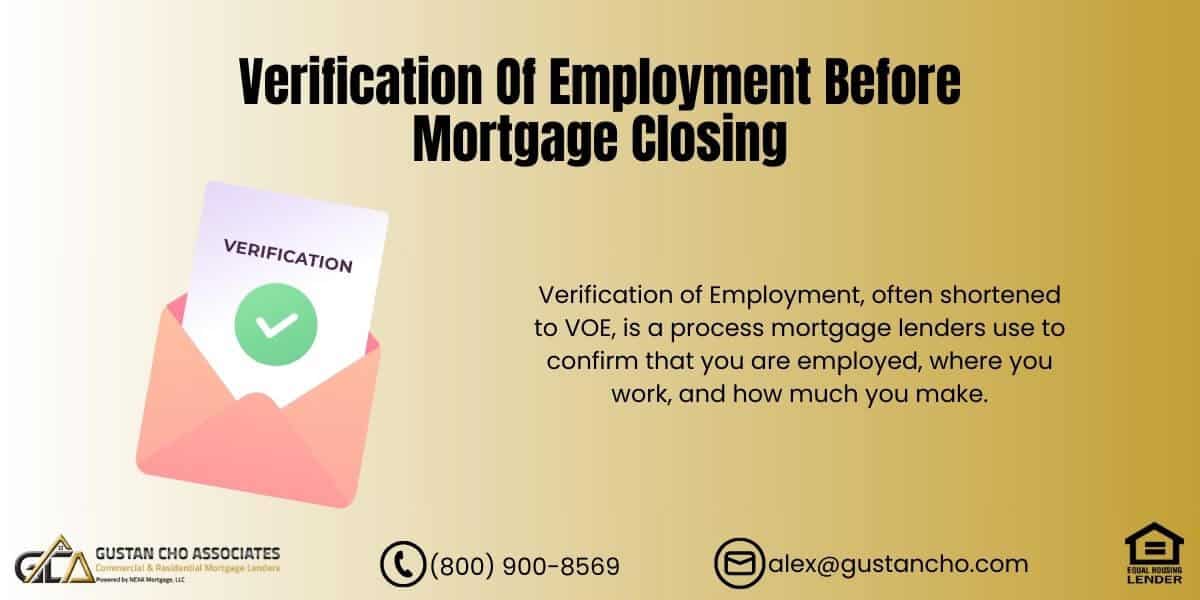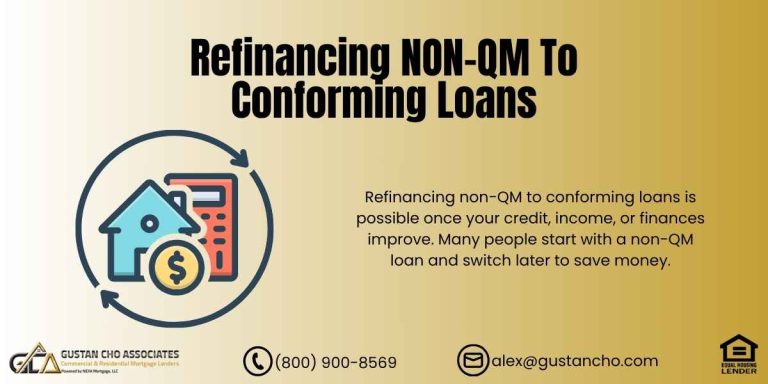Verification of Employment (VOE): Why It’s Crucial for Securing Your Mortgage in 2024
Whether you’re ready to purchase your first home or refinance an existing mortgage, understanding the importance of Verification of Employment (VOE) is essential. In the mortgage world, lenders need to know you have a stable income and can keep up with monthly payments. VOE verifies both your job and income, making it a critical step in getting that mortgage approval.
Below, we’ll cover everything you need to know about the VOE process in 2024, why it matters, and how it affects your ability to buy or refinance a home. Plus, we’ll share tips to make sure your VOE process is smooth and efficient.
What Exactly Is Verification of Employment (VOE)?
Verification of Employment, often shortened to VOE, is a process mortgage lenders use to confirm that you are employed, where you work, and how much you make. This process is done through both written and verbal confirmations with your employer’s HR department to verify the income you’re using to qualify for your mortgage.
VOE is essential because it gives lenders confidence in your income stability and ability to manage your new mortgage. This verification process is especially crucial now as lenders prioritize documented income to reduce the risk of mortgage defaults.
Ready to Close Your Mortgage? Let’s Make Sure Your Employment Verification is in Order!
Contact us today to make sure your verification of employment is complete and your mortgage is ready to close.Key Points of VOE You Should Know:
- Two Steps in the VOE Process: VOE happens at two points in the mortgage process.
- Initial Verification: This occurs at the beginning, often during pre-approval, to confirm you qualify based on your job and income.
- Final Verification: Conducted just days before closing to ensure no significant changes in employment or income.
- Why Is Verification of Employment So Important? Lenders use a Verification of Employment (VOE) to ensure that an applicant’s income is consistent and sufficient. This process assures that individuals can comfortably handle their monthly payments, including Principal, Interest, Taxes, and Insurance (PITI), without undue financial pressure.
Types of Verification of Employment (VOE) in 2024
Understanding the types of VOE lenders can help you prepare for the mortgage process.
- Written VOE: The lender contacts your employer’s HR department to request a detailed employment verification document. This document includes your position, start date, and income details, sometimes with a breakdown of base salary, overtime, and bonuses.
- Verbal VOE: Often used closer to the closing date, a verbal VOE is a phone call made to confirm your employment status has not changed. It’s a final check to ensure there’s no risk to your mortgage approval.
Why VOE Is Essential for Mortgage Approval in 2024
Lenders prioritize documented income now more than ever. Here’s why Verification of Employment is so critical:
- Income Stability and Continuity: For lenders, a steady, documented income provides the reassurance needed to issue a mortgage. Your job history and likelihood of continued employment for the next three years are assessed to ensure you’re financially prepared to take on a mortgage.
- Reduces Lender Risk: VOE minimizes risk by helping lenders avoid approving loans for borrowers who might struggle with mortgage payments.
- Avoids Last-Minute Closing Issues: A smooth Verification of Employment process at the beginning and end of your mortgage application can prevent unexpected issues and ensure an on-time closing.
- Allows Inclusion of Supplemental Income: Verification of Employment provides detailed documentation for applicants with additional income sources (like overtime or bonuses), allowing these to count toward your mortgage qualification.
Types of Income That Qualify for Verification of Employment
Your job and salary aren’t always the only qualifying factors. Lenders recognize various income types, which can help strengthen your application if you have a diverse income profile.
- Base Salary: Straightforward and common, typically used as the primary income source.
- Overtime and Bonuses: Qualifying income if it’s consistent, with a history of at least two years.
- Part-Time Income: Lenders may consider it if you’ve worked a stable part-time job for at least two years.
- Seasonal and Commission Income: Consistent seasonal income or commission can qualify if it’s been steady for two years.
Pro Tip: Ask your loan officer if you have questions about what income counts. They can clarify eligible income sources and help streamline your application process.
Timing of VOE: When Lenders Verify Employment During the Mortgage Process

- Initial Verification (During Pre-Approval): Lenders confirm your job and income details to get pre-approved. This initial VOE can help secure a pre-approval letter, reassuring sellers that you’re a qualified buyer.
- Final Verification (A Few Days Before Closing): This last check confirms that your employment status has changed since pre-approval. It’s essential to avoid any job changes during this period, as any income fluctuation could impact your mortgage eligibility.
What Happens if You Change Jobs During the Mortgage Process?
It’s not uncommon to change jobs, but timing is everything when applying for a mortgage. Here’s how different job changes might affect your loan:
- Switching to a Similar Job with Comparable Income: Lenders may accept the new job with additional documentation if the move is lateral and income remains stable.
- Switching from W-2 to 1099 (Self-Employment): You’ll generally need two years of self-employment income history before it counts toward your mortgage qualification.
- Moving from Self-Employment to W-2: Typically, you’ll only need 30 days of paycheck stubs to qualify again.
Tip: Talk to your lender before making any employment changes. A quick consultation can help avoid delays or complications.
Employment Gaps and Mortgage Eligibility
Many borrowers worry about employment gaps. The good news is that lenders allow gaps under certain conditions:
- Unemployed for Less Than Six Months: You can still qualify if you’re back to work, as long as you can provide at least 30 days of pay stubs and a job offer letter.
- Unemployed for Over Six Months: You’ll need to be employed at the new job for at least six months before the income can count toward your mortgage.
This flexibility helps many borrowers with non-linear job histories qualify for homeownership.
Using Alternative Income for Verification of Employment in 2024
For many, income isn’t limited to a regular paycheck. Lenders can also consider alternative income sources, as long as it’s likely to continue for the next three years:
- Social Security and Disability: Non-taxable Social Security and disability income can be “grossed up” by about 15%.
- Pension Income: Considered if it will continue for at least three more years.
- Alimony, Child Support, and Royalties: These incomes count if they are court-ordered and stable for the next three years.
This makes the Verification of Employment process inclusive for borrowers relying on diverse income sources.
Impact of Giving Notice or Quitting During the Mortgage Process
If you’re thinking of giving notice or quitting your job during the mortgage process, it’s best to pause. Here’s why:
- Risk of Approval Withdrawal: Lenders may pull your approval if you quit before closing since they rely on future income stability.
- Impact on Final Verification: Lenders check if you’ll likely stay in your job for at least three years. If you give notice, the answer is often “no,” which can disrupt or end your loan approval.
To avoid losing your loan, try to delay any big career moves until after your mortgage is finalized.
Need to Verify Employment Before Closing? We’re Here to Help You!
Contact us today to ensure your employment status is confirmed and your loan is ready to finalize.Verification of Deposit (VOD): Another Step in Mortgage Approval
Many lenders will require a Verification of Deposit (VOD) along with VOE to confirm you have sufficient funds for closing costs, the down payment, and other expenses. The VOD checks:
- Current Balance: Ensures you can cover upfront costs.
- Average Balance: Confirms stability and reduces risk for the lender.
- Recent Account Activity: Helps ensure no sudden, unexplained deposits.
Having this in place supports your mortgage application, showing the lender you’re financially prepared.
Key Takeaway: VOE Is Essential to Mortgage Approval in 2024
Verification of Employment helps lenders confirm your financial stability and ability to manage mortgage payments. Understanding how it works—especially when combined with other steps like Verification of Deposit—can help make your homebuying or refinancing process smoother. With thorough preparation and insight into VOE requirements, you’ll be ready to move confidently through your mortgage journey in 2024.
Ready to explore your mortgage options? Contact us at Gustan Cho Associates to discuss how our loan officers can guide you every step of the way.
Frequently Asked Questions About Verification of Employment:
Q: When Does the Verification of Employment Happen?
A: Verification of Employment is conducted early in the process and again just before closing to verify job and income details.
Q: What Types of Income Count?
A: In addition to your salary, income types like overtime, bonuses, and even Social Security can qualify if they meet consistency standards.
Q: What is a 10-day Payoff Verification (PCV)?
A: This provides the payoff amount to settle a mortgage in 10 days, which helps refinance or close a loan.
Q: How do Employment Gaps Impact my Loan?
A: Gaps under six months are often okay; longer gaps require at least six months at the new job.
Q: Can I Quit my Job After my Mortgage is Approved?
A: It’s best to avoid quitting or giving notice, as this could delay or disrupt your loan approval.
Q: What is Verification of Deposit (VOD)?
A: VOD confirms you have the funds for the down payment and closing, adding another layer of financial security for the lender.
Q: Can Part-Time Income Qualify for a Mortgage Through VOE?
A: Yes, part-time income can be used to qualify if it has been consistent for at least two years. The lender will verify this income through Verification of Employment to ensure it is stable and likely to continue.
Q: How Does Maternity Leave or Medical Leave Impact VOE?
A: If you’re on maternity or medical leave, your lender will likely still verify your employment. Some lenders may require a letter from your employer stating that you are expected to return to work, and your leave status may affect how your income is calculated.
Q: Do Lenders Verify Past Employment as Part of VOE?
A: Lenders sometimes verify previous employment, especially if you recently changed jobs. They want to ensure you have a stable two-year employment history, which can support your application and income consistency.
Q: What Should I do if my VOE Reveals Inconsistencies in my Income?
A: If there are inconsistencies, it’s important to clarify with your lender and provide any necessary documentation, such as pay stubs or tax returns. A letter from your employer explaining variable income (like bonuses or overtime) can also help satisfy lender requirements.
Related> How do lenders view income and employment?
Related> Switching employment during the mortgage approval process
This blog about “Verification Of Employment Before Mortgage Closing” was updated on November 5th, 2024.









